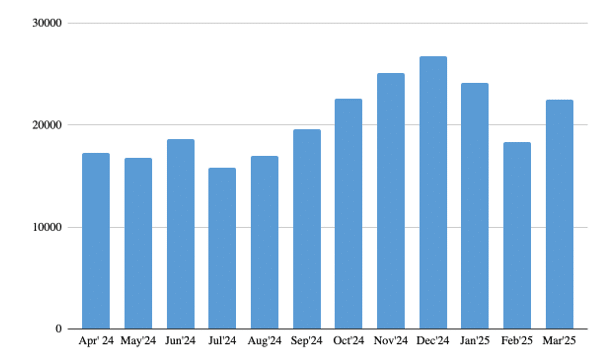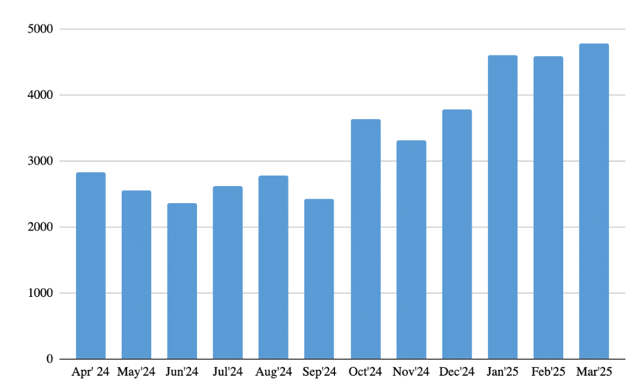From Naruto to Attack on Titan, cybercriminals are increasingly using anime and other Gen Z favorites as bait. In a new report covering Q2 2024 – Q1 2025, Kaspersky has found over 250,000 cyberattacks disguised as popular anime among other shows and streaming platforms favored by younger audience. To help Gen Z recognize these and other cyber risks, Kaspersky is launching “Case 404” — an interactive cybersecurity game, teaching how to protect their digital lives.
For many members of Generation Z, streaming is more than a pastime, it’s a way of life that provides connection to the characters, worlds and fandoms that define their identity. From anime to nostalgia-fueled movie marathons, Gen Z’s connection to on-screen worlds runs deep. This unique attachment creates a security paradox: the more emotionally invested the viewer, the easier it is to trick them, and Gen Z’s enthusiasm is proving dangerously exploitable.
This is extremely evident in anime culture. Over 65% of Gen Z regularly watch anime, making them the most anime-engaged generation in history. For our analysis, Kaspersky’s experts selected five popular anime titles among Gen Z: Naruto, One Piece, Demon Slayer, Attack on Titan and Jujutsu Kaisen. Kaspersky found 251,931 attempts to deliver malware or unwanted files disguised under the names of these anime titles. Cybercriminals are tapping into the trust and affection Gen Z has for these series, often using bait like “exclusive episodes”, “leaked scenes”, or “premium access”.

Attempts to attack users through malicious or unwanted files disguised as Gen Z’s favorite anime throughout the reported period
Among anime titles, Naruto took the top spot, despite first airing more than two decades ago. Over the reported period, it was used as bait in 114,216 attempted attacks. Demon Slayer followed with 44,200 attack attempts. Its meteoric rise in recent years, amplified by viral moments and a growing global fanbase, made it a natural target for cybercriminals looking to ride the wave of hype. Meanwhile, Attack on Titan — a long-standing favorite — ranked third with 39,433 detected attempts to distribute malicious content.
Apart from anime, Kaspersky also analyzed five iconic films and series that continue to resonate with Gen Z: Shrek, Stranger Things, Twilight, Inside Out 2, and Deadpool & Wolverine. These shows alone accounted for 43,302 attack attempts with a pronounced spike in attention to these titles from cybercriminals at the beginning of 2025. This is primarily connected to the rise of attacks on Shrek, with over 36,000 attempts in total and a sharp spike in March 2025, double the monthly average for 2024.

Attempts to attack users through malicious or unwanted files disguised as Gen Z’s favorite films and series throughout the reported period
Platforms like Netflix, Amazon Prime Video, Disney+, Apple TV Plus and HBO Max have reshaped movies, series, and anime watching into an immersive, on-demand experience that caters to Gen Z’s love of personalized content and global storytelling. However, this has also created fertile ground for cybercriminals. Kaspersky detected 96,288 attempts to distribute malicious or unwanted files disguised as the names of these major streaming platforms. Unlike seasonal trends, streaming platforms offer a continuous flow of content, from highly anticipated premieres to hidden gems that viewers discover months or even years after release.
When examining which streaming services were most frequently used by cybercriminals, Netflix stood out by far, involved in 85,679 attack attempts and associated with over 2.8 million phishing pages imitating its branding. Cybercriminals take advantage of the constant traffic, broad global reach, and frequent subscription-based activity. They mimic login pages, share “free trial” links, or spoof password reset emails with full knowledge of how central Netflix is to Gen Z’s digital routine.
As Gen Z’s daily life becomes inseparable from streaming platforms, fandom spaces, and social media communities, cyberthreats evolve to mirror their interests. To meet this challenge, Kaspersky has launched an interactive online game, “Case 404”, designed specifically for Gen Z. “Case 404” invites players to become cyber-detectives and solve immersive cybercrime cases. Through this digital adventure, Kaspersky is not just highlighting risks but empowering Gen Z to develop their mindset and skillset to stay safe in an increasingly vulnerable online world. As a reward for completing the game, participants receive a discount on Kaspersky Premium, giving them trusted tools they need to navigate the digital world safely.
“As the world of entertainment continues to evolve, so do the tactics used by cybercriminals to exploit popular content, whether through fake downloads or fraudulent merchandise offers. From beloved anime like Naruto and Demon Slayer to the latest blockbusters like Inside Out 2, scammers have found new ways to take advantage of Gen Z's affinity for digital culture and streaming platforms. With the rise of these cyberthreats, it's more important than ever for young users to stay vigilant and understand how to protect themselves online,” comments Vasily Kolesnikov, security expert at Kaspersky.
To
watch favorite shows safely, Kaspersky recommends:
● Check out the interactive online game, “Case 404” by Kaspersky, explicitly designed for Gen Z to learn how to stay safe in an increasingly vulnerable online world.
● Always use a legitimate, paid subscription when accessing streaming services and ensure you’re using apps from official marketplaces or the official websites.
● Always verify the authenticity of websites before entering any personal information. Stick to trusted, official pages when watching or downloading content and double-check URLs and company name spellings to avoid phishing sites.
● Be cautious about the file extensions you're downloading. Video files should not have .exe or .msi extensions — these are typically associated with harmful programs.
● Use a reliable security solution, like Kaspersky Premium, to detect malicious attachments that could compromise your data.
● Ensure secure browsing and safe messaging with Kaspersky VPN, protecting your IP address and preventing data leaks.
Threat Research
The Threat Research team is a leading authority in protecting against cyberthreats. By actively engaging in both threat analysis and technology creation, our TR experts ensure that Kaspersky’s cybersecurity solutions are deeply informed and exceptionally powerful, providing critical threat intelligence and robust security to our clients and the broader community.
